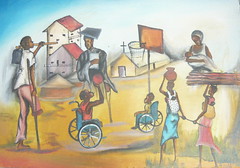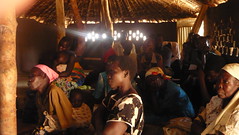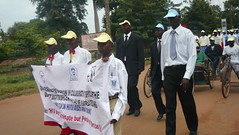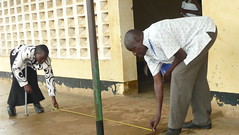Though I’ve been back in the US for almost two weeks, I’ve been having trouble sitting down to write this entry. The jetlag is over, so that excuse is no good since I can sleep past 4am again…I’m a week away from starting a new job (continuing disability advocacy work stateside in Indiana – yay!), but my current schedule is free, so I can’t peg busy employment, either…If I’m honest with you—and myself—writing this blog means that it’s over. That I’m home. That GDPU is 7,500+ miles away and yet somehow as close as ever.
In the last few weeks with GDPU, I had some good conversations with Fred, Project Coordinator, about “unpacking the vision,” as he called it. I know what GDPU’s mission and vision are: empowering persons with disabilities to lead dignified lives. But what does that mean, exactly? Like actually mean? Our conversation led to some great realizations for GDPU, and for myself. What does dignity look like to people with disabilities? To Gulu? To Ugandans? To post-war regions? To Americans? To the West? To you? To me? To people with disabilities (PWD)? To Fred, Monica, Simon, Irene, Komakech, Richard, Allan, Josephine, and others? To PEOPLE? How do they strive to maintain it, and how do others – including you and me – deny, define, or promote dignity?

This is the painting I got for GDPU when I left. It was done by a local artist in Gulu, Timothy, based on the theme "Disability is not Inability."
As a Peace Fellow with The Advocacy Project, my role was to amp up their efforts, mainstream their mission, promote their purpose both locally and abroad, and jump in with technological and grant-writing support where needed. I hope I succeeded in that task, with some admitted slip-ups along the way. And I’m excited to share that GDPU’s website is 95% finished, pending some aesthetic/technological switches (Check it out! www.guludisabledpersonsunion.org). If the training stuck, hopefully the website will be updated regularly by GDPU staff and become a source for services and sharing within the region. Also, see below for the short “In our own words” video featuring people with disabilities at GDPU.
Truly, sustainability is always on my mind when it comes to international development: long-term impact versus short-term polish. Did my three months with them really make a difference? A marked change? Was it “not a summer for me, but a summer for them,” as I wished in my opening video blog? For now, time is my scapegoat to avoid answering. We’ll see…but I hope so.
I’m finding that where I take comfort in my departure is that though I am adjusting, missing, reliving, trying to maintain a relationship with GDPU, worrying about impact, and pining to return to Gulu, GDPU continues to do their work. More so, GULU continues to do their work. While Advocacy Project fellows often bring new ideas, energy, and knowledge in certain fields (especially technology), GDPU is its own everyday “advocacy project,” ready to face the task at hand.
Advocacy doesn’t stop when a Peace Fellow leaves her station. Advocacy doesn’t stop when the power goes out in the office, leaving the staff in the dark for hours or days at a time. Advocacy doesn’t stop when grants are rejected, policies are ignored, meetings are cancelled, roads are rained out, or wheelchairs break.

Advocacy is about educating yourself and others - like these caretakers of children with cerebral palsy in Koyo.
Advocacy stops when the job is finished; the mission met; the people served; the purpose fulfilled; the promise delivered. The best non-profits work for the day when they won’t be needed – when they can close their doors, turn off their computers, retire their logos, and make their fight a chapter in history because the problem is solved.
Realistically, that will probably never happen for most groups, including GDPU: war and violence will always leave destruction in its wake (like landmine survivors Irene, Stephen, and others from the LRA insurgency); children will lack quality and equal education (like the 51% of Gulu’s children with disabilities who don’t go to school); discrimination and prejudice will deny services (like the 61.5% of PWD who never received HIV/AIDS education); lack of leadership to enforce policies will perpetuate problems (like the government building in Nwoya without a ramp); dependence on donations will drive programming (like the grant-to-grant survival of GDPU); and everyday rights will be denied as others take it for granted (like going to the bathroom with ease and dignity). *See my previous blogs for more on each of these http://advocacynet.org/wordpress-mu/rscherpelz/feed/.

Advocacy is about demonstrating and sharing your purpose - like these partcipants in GDPU's HIV/AIDS awareness parade and debate in July.
But is that a reason NOT to speak up? Can progress not be made? Does short-term defeat warrant long-term surrender? For the people of GDPU, it is a resounding “NO.” They have already seen improvement and change and won’t throw in the towel. Even oppression, ignorance, discrimination, and the harshest of all, apathy, can’t stop advocacy. Much like a tree falling in the woods, as long as there is a voice and the courage to use it, advocacy happens. And thenyou hope that someone has the courage to hear it. GDPU can be an advocate. I can be an advocate. YOU can be an advocate.
That’s the beauty of it. I don’t have to be living in Gulu to support GDPU, PWD, and the disability movement in general. YOU don’t have to have a passport, speak the language, get the vaccinations, or shower with a bucket to lend your voice. Speaking up at your office if you notice there isn’t an accessible entry helps. Encouraging your child that his classmate with cerebral palsy ALSO likes Spongebob Squarepants helps. Moving a bike or trashcan that is blocking a ramp, Braille sign, or automatic button helps. Curbing your discomfort to stare at a “missing” appendage (or worse: staring so intently elsewhere that the veins of concentration in your face bulge…Note: a person with one leg knows he has one leg. He knows YOU know he has one leg. Act normal because it IS normal) helps. And understanding that access, opportunity, equality, justice, and support for people with disabilities is not a FAVOR but an inherent RIGHT changes things. If I’ve learned anything in my three years working with people with disabilities it’s that they don’t deserve, warrant, or want your pity – they deserve, warrant, and want your respect.

Advocacy is about creating, implementing, and maintaining policies and expectations, like GDPU's Accessibility Audit team checking out a ramp.
The “Thank You” Part:
On a personal note, there are many people to whom I owe the utmost and heartfelt gratitude for support, guidance, love, and help. To GDPU – it was an honor to serve with you. Thank you for welcoming me to work alongside you and learn from you. I hope we meet again. To the members and friends of GDPU – thank you for lending your voice and efforts to support PWD everyday. It. Is. Inspiring. To Mama and her family, ages 1 and up – thank you for housing, feeding, and embracing me each and every day. It was a joy to come home to you! To Gulu in general, thank you for your spirit of joy, generosity, and healing from the deepest hurts. I admire you so much.
Stateside, I owe countless thanks to the supporters and donors who made the experience possible – I hope I put your generosity to good use. If you ever get the chance to visit, please take the opportunity! To Iain, Karin, Erika, and Pegah at AP – thank you for guiding us fellows through the process and more importantly, for driving peace, advocacy, and collaboration on the global scale! Lastly, a fervent thank you to Mom, Dad, and my closest family and friends who let me rant via email, stayed up late to catch me on Skype, heard about my best and worst days, and curiously answered spontaneous phone calls from “out of area” numbers. I couldn’t have done it without you.
To those who I had the pleasure of getting to know, I am family – a daughter, a sister, an “auntie,” and a friend. To most of Gulu, though, I’m likely still an outsider: a munu, an aid-worker, a hassle, a helper, a donor, a development worker, a burden, a rich Westerner, an annoyance, a curiosity. And really…that’s okay. This is their Gulu, their Uganda, their suffering, their healing, their growth. If I’ve done even the slightest bit to support, promote, or champion their efforts, then I hope my time was well spent.
To GDPU and my Gulu family: Apwoyo matek tutwal. Apwoyo tic ki apwoyo konya. Cwinya opoke, mokena di kuja ki mokena di can. Aciro dugo. Amari. Apwoyo.
Kuc ki mara,
Akello Rebecca
Posted By Rebecca Scherpelz (Uganda)
Posted Sep 27th, 2011


1 Comment
Caryn
September 27, 2011
What a great insight into your work in Gulu and the world in general. It’s been a pleasure to keep up with all that you’ve been doing and I know your time in Uganda, while it seems like not enough made some huge impacts on people. Any time you give of yourself someone is better for it.